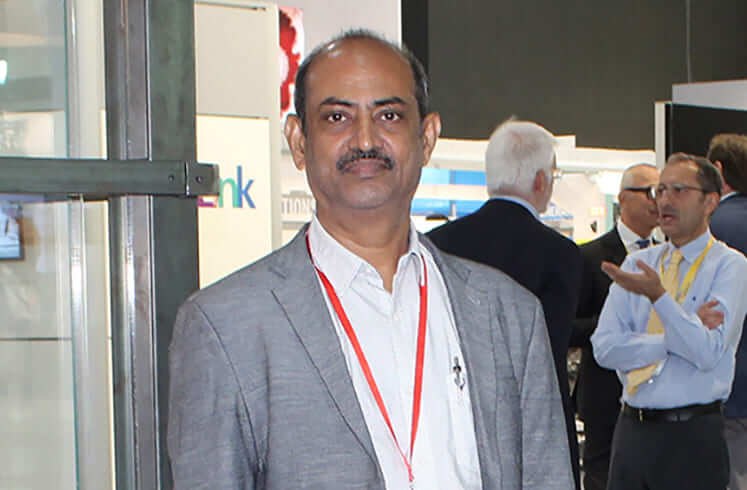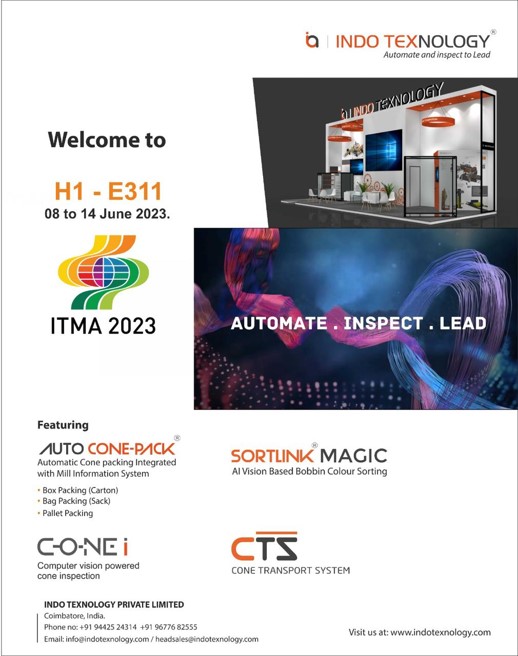Indo Texnology news 21-Dec-2022
Indo Texnology offers innovative technology on textile industry with cost-effective automation solutions

Today the textile industry needs to strengthen the existing product lines presenting new value-added products, to cover a wider market by diversifying their offer. Particularly, spinning mills are slowly moving towards automation from the opening lines to the finished product. In today’s scenario, besides production cost increase, there is a major shortage of operators in textile mills. The solution to increase productivity and reduce production costs lies in automation in the mill’s production process at the same time not at the expense of huge investment of latest and fully automated plants
In the last couple of decades, textile companies have accomplished a certain level of process automation by either upgrading the older machinery and equipment or by moving for newer fully automated machines, which are having a positive impact on quality, productivity, overall machine efficiency and costs. Upgraded textile mills could then create new opportunities to penetrate into new markets and improve their high value added products.
The ultimate goal seems to be the fully automated textile mill where quality is maintained consistent, manpower and energy consumption are reduced and the manual error is avoided.
Identifying an opportunity in the field of system and process automation, Mr. Thirupathi started Indo Texnology in 2007. The company has been focusing on designing and commercializing automation solutions for the spinning and weaving process of the textile industry. Today, Indo Texnology has established itself as a provider of automation solutions for the textile industry.

Automatic cone packing
In most industries the final packaging is fully automated like pharmaceutical or FMCG products, but in textile the level of automation at the final packaging is still very low. To cater to this need Indo Texnology has recently launched the Fully Automatic Cone packing system. He says: “We are the first and the only Indian manufacturer to offer this solution. We have made appropriate changes to the product based on the customer requirement and the actual usage conditions in our mills. In terms of reliability, speed and automation, we have provided solutions which are customized and configured to suit customers to the Indian market”.
The first machine installed in the Vardhman Group has been performing up to customer expectations.
Mr. Thirupathi, Managing Director of Indo Texnology, says: “Shortage of skilled labor, high labor turnover and lack of proper systems is increasingly becoming a cause for concern for textile mills. Hence mills are looking at more process and system automation. We work jointly with our customers, understand their requirement and the pain points and develop a solution which suits their requirements best and at a cost which is more acceptable”.
One of the first products that Indo Texnology introduced was Balexpress – the automatic baling solution for process (cotton) waste. The company introduced this product in 2007 and today it has close to 90 per cent market share in the Indian market for automated baling systems.
Initially, in 2007, only the big mills opted for such solutions, but today almost all new projects, small and big, have gone in for this system. Today it is considered a standard requirement in all the mills more from operational convenience. “We have close to 240 installations across India, which include all the major customers. We have been able to provide a good reliable solution manufactured and serviced locally and we are continuously working on further improvising the products by adding new solutions”, says Mr. Thirupathi.
At India-ITME 2012, Indo Texnology launched SORTLINK, the retrofit attachment on auto winders for sorting of bobbins automatically. This has yielded significant labor saving. Today the company has more than 200 installations of SORTLINK across many leading mills. The system developed by the company has also been patented. This is suitable for all RM type winders. “The SORTLINK has been a very successful product and we expect good demand for this machine”, remarks Mr. Thirupathi.
Leave a Reply
Your email address will not be published. Required fields are marked *

